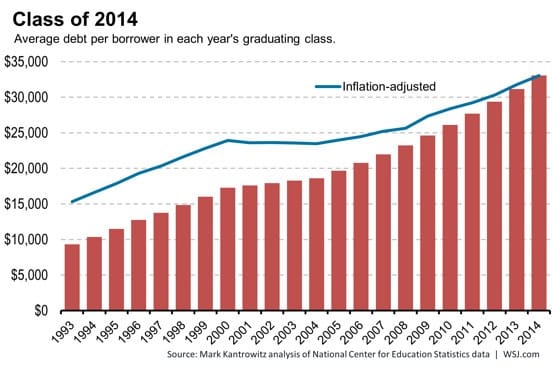In our humble opinions, the current education system will go the way of the Dodo bird in the not-too-distant future. We applaud this and look forward to its collapse. The current system is both broken and beyond repair, but could self-education be the solution to the problem?
Education in today’s world has become little more than a racket; you are fleeced of tens of thousands of dollars in exchange for a worthless piece of paper that does nothing to distinguish you from from your peers. This insanity has to stop. It’s time we changed the very idea of education and the path about which someone acquires it. In our view, education is something you do for yourself, not something that’s given to you or done for you.
As Doug Casey likes to say, “most college students spend their time doing little more than drinking beer and chasing girls.” Most college graduates can probably attest to that. In Doug’s time, not everyone went to college so those that did were able to set themselves apart from the herd. But this is no longer the case. Most young people today go to college, but once everyone is doing something, it’s no longer unique. As a result, most college graduates today have no way of distinguishing themselves from the herd of identical clones with identical degrees.
The Benefit Of Self-Education
Here are two disturbing facts that anyone thinking about attending college in the future should consider:
The average student loan debt as of 2014 is approaching $35,000.
Take a look at the chart below to see the trend in total student loan debt over the years.
With each passing year students accumulate more and more debt which they will spend many of their working years paying off. And this is just student loans, add to that a mortgage, car loans, and credit card debt and you’ve got yourself a real problem. What we’ve managed to do over the years is create an entire generation of indentured servants. We’d like to keep you from becoming one of them.
The current employment rate as of May 2015 is reported at 5.5%.
(However, based on the historical method of calculation, many think it is closer to 20% or more… )
That’s what future college grads have to look forward to: lots of debt and no way to repay it. By the way, student loan debts are largely non-forgivable.
The reason for this problem is fairly simple. A college or university gives graduating students one thing and one thing only: a diploma. Do you know what it doesn’t give you? Skills and experience. Now guess what two things employers are looking for in potential new employees? If you guessed skills and experience, you’re exactly right. The two things young people need from college are the two things that almost none of them get. It’s time for young people to shun higher learning and take a more practical approach to self-education.
So if going to college or university is no longer an advantage, what should you do as an alternative? Simple, acquire valuable and marketable skills on your own. Not a worthless piece of paper saying you’ve acquired some theory, but proof that you can actually do something. (FYI, many of these skills can be learned for FREE.)
That being said, there is exactly one type of person who should go to college or university in today’s changing environment: a person looking to study a hard science. By hard science we mean engineering, physics, chemistry, biology, medicine, etc. Anything that must be learned in a controlled environment by accredited experts is probably worth the time and cost. If that’s the career path you want to take, then college is a good choice for you. But everyone else, not so much.
Here’s a little secret you won’t hear anywhere else: employers don’t care where you went to college or what you studied. They want to know how you’re going to increase their bottom line. Plain and simple. Most business owners know that the majority of degrees aren’t worth the paper they’re printed on.
The most efficient way to learn is by doing, not by sitting in a classroom. It’s also often the cheapest way. Want to learn economics? Start a house painting business in the summer in your hometown. Want to learn art history? Check some books out of the library and watch some YouTube videos. Want to learn art itself? Buy some paints, brushes, and a canvas and get to work. Most skills can be learned either for free or for negligible costs. There’s almost no reason to go into debt to learn a skill today that isn’t a hard science.
That’s what you want to do, learn a skill or skills by accumulating experiences. And they must be specific, marketable skills which are not held by the majority of the people around you. Your goal is to distinguish yourself, not be just another faceless applicant. That’s what college is for.
So how does one go about doing that? The answer is simple: self-education. As I said earlier, education is not something someone else gives you, it’s something you do for yourself.
These days you can learn almost anything you’d ever want to know online, much of it for free. There are free websites that will teach you a specific skill like programming (www.codecademy.com) and MIT and other universities have pooled together and put much of their coursework and lectures online for free (www.ocwconsortium.org). With the infinite amount of free or low cost knowledge out there, it’s no longer necessary to burden yourself with student loans to acquire it.
Here’s a better plan:
1. Make a list of valuable, marketable skills that you’d like to acquire. These should be in an area that you’re interested in. In fact, some may be what you’re already doing as a hobby. Non surprisingly, people tend to be much more knowledgeable and skilled at something they actually like doing.
2. Dedicate a certain amount of time each day to learning these skills on your own. Among the internet, books, webinars, magazines, and etc., there is literally an ocean of knowledge out there just waiting for you to dive into. At no time in human history has learning been easier than it is today. Take advantage.
3. Introduce yourself to people who already have the skills you want to acquire. Make connections with them. Offer to work for them for free just for the experience (don’t underestimate the power of an apprenticeship). This alone will give you what college only promises to: skills and experience. You’d be shocked to find out how many professionals would jump at the opportunity to have free labor in exchange for teaching you their craft.
4. Find a place to practice your skill where there isn’t already entrenched competition. You don’t want to try to unseat established operators. The odds are strongly not in your favor. However, there are likely places in the world where you could go and become the entrenched competition that someone else would have little chance of unseating. This is one sure-fire way to help increase your value and earnings significantly.
5. Find a way to distinguish yourself within your trade. Create something of value that helps you stand out. Constantly be an innovator who thinks outside the box. Steve Jobs at Apple is a perfect example of this. While you may never reach his stature, you’ll likely find that by following his example you not only benefit financially, but you’ll create a lot of opportunities for others to benefit as well. Steve certainly made plenty of other people rich besides himself (with no college degree). There’s no reason you can’t do the same.
Instead of spending four years wasting time, drinking beer and chasing girls, spend that time acquiring skills on your own. You can still drink beer and chase girl in your spare time. But don’t take on debt and waste four years to do it. Don’t become another faceless applicant competing for jobs with no experience to market yourself. In short, don’t do what everyone else is doing.



